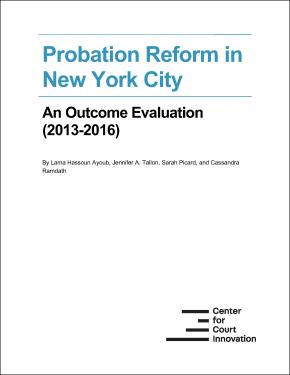4.5 million Americans are under probation or parole and punishments for violations are a major driver of prison and jail populations across the country. Calls for meaningful reform are growing. This study examines the impact of New York City’s early efforts to shift to a more client-centered approach to probation, including the implementation of case management informed by the Risk-Need-Responsivity model, and the establishment of neighborhood-oriented probation offices in areas with higher than average rates of probation supervision.
While neither of the new approaches yielded significant impacts on rates of revocation or re-arrest, clients did report improvements under the neighborhood model. Specifically, results from interviews with more than 300 probation clients suggest that neighborhood-oriented probation made it easier for clients to report without missing work or facing transportation challenges, improved perceptions of transparency and voice, and provided connections to more community services.


